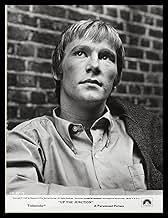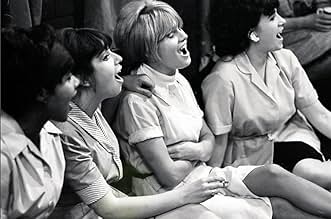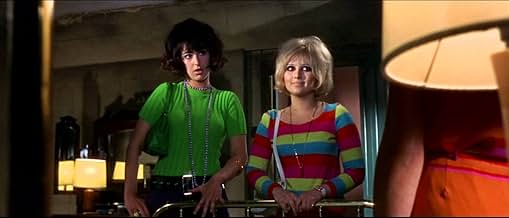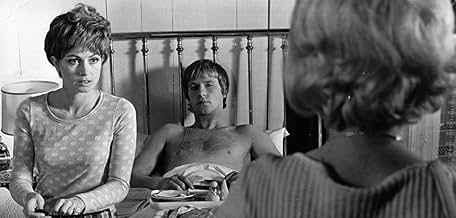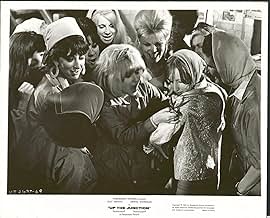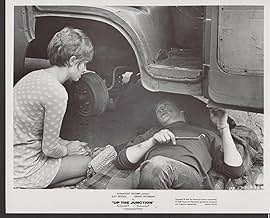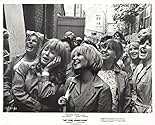NOTE IMDb
6,9/10
1,1 k
MA NOTE
Ajouter une intrigue dans votre langueAddresses some of the major 60s social issues - a bored rich London-girl from Chelsea decides to go "slumming" in depressed Battersea, getting a flat and starts factory-work and makes friend... Tout lireAddresses some of the major 60s social issues - a bored rich London-girl from Chelsea decides to go "slumming" in depressed Battersea, getting a flat and starts factory-work and makes friends... of which one has to get an illegal abortion.Addresses some of the major 60s social issues - a bored rich London-girl from Chelsea decides to go "slumming" in depressed Battersea, getting a flat and starts factory-work and makes friends... of which one has to get an illegal abortion.
- Réalisation
- Scénario
- Casting principal
- Récompenses
- 1 nomination au total
Avis à la une
A very likeable if dated view of working class 60's London viewed the eyes of upper crust Polly Dean. Several tough and controversial issues (illegal abortions & wife beating) are covered which must have been brave at the time that the film was made. Strangely prophetic in the 'gentrification' of Battersea (one of the up-areas in recent property prices). Having been in the year I was born, I cannot fully comment on the authenticity of this films view of 60's life. However from my perspective and that of older relatives it is fairly accurate. The soundtrack (by Manfred Mann) is a superb slab of sixties beat\psychedelia. The characters are very likeable and the film is in my opinion a good introduction for any scholar of the period. 9/10
I first saw this film on late night TV in Melbourne, Australia, in the late 1980s. I love it then, but wasn't able to view it again until recently, and enjoyed it as much as my first viewing almost 30 years earlier.
One of the first things I remembered thinking after first viewing it is – why isn't this film better known? It's one of the great British films of the 1960s, and a fine example of the 'kitchen sink' genre. Added to that, it has superb widescreen cinematography – every scene is beautifully shot, the outdoor scenes particularly so. Working class London in the 60s was a ramshackle, beautiful if run-down environment. The film captures a lost world – it's a fascinating historical document as well as a serious movie.
The cast is spot on,it's all very believable, and the leads have a genuine chemistry. Suzy Kendall may have had a limited acting range – but she's perfect in this role. And so beautiful!
The story tackles all manner of social problems not just of the 60s, but universal ones applicable today as then. Some scenes are still quite disturbing to watch – this is not some 'swinging London' expose, but an accurate glimpse in to the life of working class Londoners before the gentrification process started.
I was fortunate to study British film at Monash Univeristy (Melbourne) under the great Brian MacFarlane in the 1990s. He's considered the world expert on British cinema, and was commissioned by the British Film Academy to write the authorised history of British cinema. One of the things MacFarlane consistently highlighted was the fact Brit film only began to portray the working class seriously from the late 1950s. Prior to that, working class were portrayed in movies as either servants, idiots, criminals or downtrodden miners etc. Up the Junction is a beautifully realised example of a time when the British finally began to take the working class seriously.
It's also the first film I can think of with a soundtrack written by a well known rock band – Manfred Mann. And though dated – the music is perfect for this film and captures something of the youth vibe then flowering across the western world. Truly – this is a shamefully underrated film and a must-see for anyone interested in London in the 1960s.
One of the first things I remembered thinking after first viewing it is – why isn't this film better known? It's one of the great British films of the 1960s, and a fine example of the 'kitchen sink' genre. Added to that, it has superb widescreen cinematography – every scene is beautifully shot, the outdoor scenes particularly so. Working class London in the 60s was a ramshackle, beautiful if run-down environment. The film captures a lost world – it's a fascinating historical document as well as a serious movie.
The cast is spot on,it's all very believable, and the leads have a genuine chemistry. Suzy Kendall may have had a limited acting range – but she's perfect in this role. And so beautiful!
The story tackles all manner of social problems not just of the 60s, but universal ones applicable today as then. Some scenes are still quite disturbing to watch – this is not some 'swinging London' expose, but an accurate glimpse in to the life of working class Londoners before the gentrification process started.
I was fortunate to study British film at Monash Univeristy (Melbourne) under the great Brian MacFarlane in the 1990s. He's considered the world expert on British cinema, and was commissioned by the British Film Academy to write the authorised history of British cinema. One of the things MacFarlane consistently highlighted was the fact Brit film only began to portray the working class seriously from the late 1950s. Prior to that, working class were portrayed in movies as either servants, idiots, criminals or downtrodden miners etc. Up the Junction is a beautifully realised example of a time when the British finally began to take the working class seriously.
It's also the first film I can think of with a soundtrack written by a well known rock band – Manfred Mann. And though dated – the music is perfect for this film and captures something of the youth vibe then flowering across the western world. Truly – this is a shamefully underrated film and a must-see for anyone interested in London in the 1960s.
This movie had a profound effect on me when I first craned my neck to see it from the front row of the Haymarket cinema in Newcastle upon Tyne. I was sixteen years old and on date with a guy that had a rich father, a triumph spitfire and the personality of deadwood. I fell deeply in love with Suzy Kendall knowing that it should have been Dennis Waterman. I saw this movie every night for two weeks. It captures those times exquisitely, almost painfully. I just need to hear the opening theme to be transported back. The clash of cultures, the poverty on both sides of the class divide. Polly had money but was surrounded by shallowness and snobbery. Her friends up the junction had loyalty, camaraderie and fun, but struggled to survive, scamming their way from pay day to pub, who was the poorer? Manfred Mann's excellent score insinuates it's way into the fabric of the movie, haunting and evocative. Give this one a chance, you won't regret it.
An absolute must see for all lovers of 1960's culture. Not only does it boast some of the decades finest actors, it has a beautiful soundtrack from Manfred Mann and the cinematography perfectly captures the feel of what it was like to live in that decade. The plotline also deals with some of the pressing social issues of the time as well, including a very sensitive portrayal of back street abortion, the only one coming even slightly close to the masterly "Alfie". Even watching this film now, I think you can really get a feel for what it was like to be young and working class in the 1960's. Great Stuff.
Up The Junction was made during the Summer of 1967 though there isn't much love & peace to be found in this film. Arguably the only likeable characters are Polly, an uptown girl who's trying to slum it in Battersea, and Pete (Dennis Waterman) the 'bit of rough' she falls for, and they're not without flaws. I always loved Dennis Waterman in Minder and his character in this film could easily pass for a young Terry McCann; anyone who doubts his ability as a straight actor should watch the showdown between Pete and Polly in the hotel room. The two sisters Sylvie and Rube are sweet & bubbly on the outside but later on reveal a nasty side, especially when mocking a work colleague who appears to have learning difficulties.
Apart from Pete, all the men are depicted as selfish, sex mad and prone to violence.
Up The Junction came out a few years after the golden age of kitchen sink drama, and maybe lacks their gritty Northern humour, but there's still plenty to recommend including some lovely, sweeping London skylines, nice views of the iconic Battersea power station, and a groovy soundtrack by Manfred Mann. Anyone nostalgic for the late 1960s will probably enjoy it.
Apart from Pete, all the men are depicted as selfish, sex mad and prone to violence.
Up The Junction came out a few years after the golden age of kitchen sink drama, and maybe lacks their gritty Northern humour, but there's still plenty to recommend including some lovely, sweeping London skylines, nice views of the iconic Battersea power station, and a groovy soundtrack by Manfred Mann. Anyone nostalgic for the late 1960s will probably enjoy it.
Le saviez-vous
- GaffesWhen Sylvie and Rube are singing in the pub, there are many cutaways which show the pub customers joining in the songs. On most of these, a large piece of dirt is visible at the top of the frame. Someone didn't perform the obligatory "hair in the gate" check before loading the film.
- ConnexionsFeatured in Film Review: Backs British Films (1968)
- Bandes originalesUp The Junction (Main Title)
Written by Mike Hugg and Manfred Mann
Meilleurs choix
Connectez-vous pour évaluer et suivre la liste de favoris afin de recevoir des recommandations personnalisées
- How long is Up the Junction?Alimenté par Alexa
Détails
- Date de sortie
- Pays d’origine
- Langue
- Aussi connu sous le nom de
- Up the Junction
- Lieux de tournage
- Beach Hotel, Marine Parade, Worthing, West Sussex, Angleterre, Royaume-Uni(hotel where Pete and Polly stay)
- Sociétés de production
- Voir plus de crédits d'entreprise sur IMDbPro
- Durée
- 1h 59min(119 min)
- Mixage
- Rapport de forme
- 2.35 : 1
Contribuer à cette page
Suggérer une modification ou ajouter du contenu manquant

